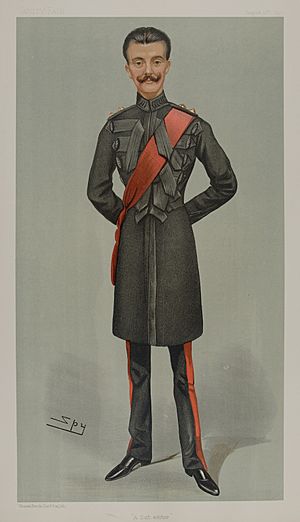George Colborne Nugent facts for kids
Quick facts for kids
George Colborne Nuget
|
|
|---|---|

Vanity Fair caricature by Spy (Leslie Ward), 12 August 1897.
|
|
| Born | 22 February 1864 |
| Died | 31 May 1915 (aged 51) Western Front |
| Allegiance | |
| Service/ |
|
| Years of service | 1885–1915 |
| Rank | Brigadier-General |
| Unit | Irish Guards |
| Commands held | 141st (5th London) Brigade |
| Battles/wars | Second Boer War First World War |
| Awards | Member of the Royal Victorian Order |
George Colborne Nugent (born February 22, 1864 – died May 31, 1915) was a brave officer in the British Army. He helped train soldiers for the Territorial Force and fought in two big wars: the Second Boer War and World War I. Sadly, he was killed during World War I.
Contents
Early Life and Education
George Colborne Nugent was born on February 22, 1864. He was the oldest son of Sir Edmund Charles Nugent. George went to a famous school called Eton.
Starting a Military Career
In 1884, George Nugent joined the Royal Military College, Sandhurst. This is where future army officers are trained. In February 1885, he finished his training. He then became a lieutenant in the Grenadier Guards.
He was promoted to captain in 1897. Captain Nugent served with the Grenadier Guards in Gibraltar. In March 1899, he became an aide-de-camp (a personal assistant) to Major-General Sir Henry Colville.
Fighting in the Second Boer War
In October 1899, Nugent and his general moved to Cape Colony. This was because more troops were needed for the Second Boer War. General Colville took charge of the 1st (Guards) Brigade. Nugent was his aide-de-camp.
The army tried to help the city of Kimberley at the start of the war. They tried a night attack at Belmont in November 1899. The attack didn't work, but Nugent was praised for his actions that night. He was also noted for his bravery at the Battle of Modder River and the Battle of Magersfontein.
When General Colville got a promotion, Nugent went with him. They fought in the battles of Poplar Grove and Driefontein. However, in May 1900, a group of soldiers under Colville's command had to surrender. General Colville was sent home. Nugent also returned to the UK. He was made a major and joined the new Irish Guards regiment in London.
Service in London
In 1901, Major Nugent became the leader of a special training school. This school, at Chelsea Barracks, trained part-time officers. These officers were from groups like the militia and volunteers.
In May 1908, he became a lieutenant-colonel. He then took command of the 1st Battalion, Irish Guards. For his leadership, King Edward VII made him a Member of the Royal Victorian Order in January 1909.
Nugent became the overall commander of the Irish Guards in July 1909. This also made him a temporary colonel. He also led the 5th London Infantry Brigade. This brigade was part of the new Territorial Force. He was promoted to a full colonel in December 1911.
After four years, Colonel Nugent was appointed Commandant of the Duke of York's Royal Military School in Dover.
World War I Service
Nugent was still the Commandant when World War I began. When the officer who replaced him in the Irish Guards was sent to France, Nugent was called back. He returned to command the 5th London Brigade.
In October 1914, his division was chosen to serve on the Western Front in France. They trained through the winter. Nugent's brigade was among the first to arrive in France in March 1915. The division was later named the 47th (1/2nd London) Division. His brigade became the 141st (1/5th London) Brigade.
The 47th Division fought in battles like Aubers Ridge and Festubert. However, the 141st Brigade was not heavily involved. During a quiet time in the trenches, George Nugent was sadly killed by a stray bullet on May 31, 1915. He is buried in Bethune Town Cemetery in France.
Family Life
George Nugent married Isabel Bulwer in 1891. She was the daughter of General Sir Edward Gascoigne Bulwer. Isabel died in 1941. They had two sons:
- George Nugent, born in 1892. He was a Captain in the Grenadier Guards during World War I. He later became the 4th Baronet in 1928 and died in 1970.
- Terence Edmund Gascoigne Nugent. He was a Lieutenant in the Irish Guards in 1915. He later became a Lieutenant-Colonel. In 1960, he was given the title Baron Nugent.
External Sources
- London Gazette
- The Sandhurst Collection
- Anglo-Boer War.com
 | Delilah Pierce |
 | Gordon Parks |
 | Augusta Savage |
 | Charles Ethan Porter |

